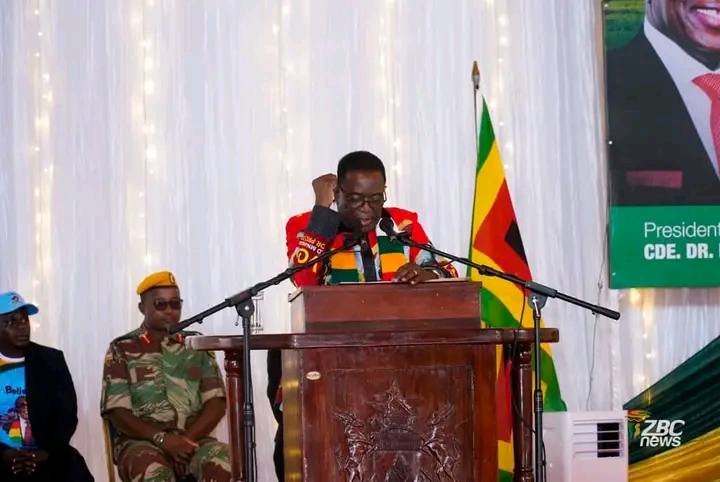By Dickson Bandera
Celebrated gospel music icons Pastor Charles Charamba and Amai Olivia Charamba are commemorating 30 years in the music industry this year—a milestone that speaks volumes of their sustained service and enduring influence on Zimbabwe’s gospel music landscape.
To mark this remarkable journey, the couple recently released a total of 30 new songs. This ambitious release stands as their first major musical project since the dual albums Abba Father and Voice of Miriam in 2017, followed by compilations including Dzevana as well as videos for their earlier hits.
The Charambas founded Rooted in Christ Ministries in 2018 and have since been deeply engaged in pastoral work. Their services are held at the Zimbabwe College of Music, the same institution where Charles Charamba earned his degree in Ethnomusicology.
What surprised many fans and industry players alike was the couple’s unexpected decision to release new music in 2025—at a time when their focus appeared to have shifted more fully toward ministry.
They kept the project under wraps, only announcing it a few days before the official release.

Over the decades, the couple has redefined the gospel genre in Zimbabwe, pioneering a signature sound that resonates with both devout believers and broader secular audiences.
Their lyrical depth, rich musical arrangements, and unwavering commitment to the Word of God have earned them admiration as respected artistes across Christian, artistic, cultural, and secular circles.
Their discography is rich with smash gospel music hits across all albums, including Tinashe Akatendeka (1997), Johane 3:16 (1998), Vhuserere (2000), Amen (2000), Exodus (2001), Daily Bread (2002), Sunday Service (2002), Verses and Chapters (2004), Charambas Live at HICC (2005), The Gospel (2006), Pashoko Pangoma (2010), WeNazareta (2014), and the collaborative projects Abba Father and Voice of Mirriam (2017).

The surprise 2025 albums, Farai Nevanofara and Chemai Nevanochema are now out and the songs are already making waves across the country.
The first eight tracks on Farai Nevanofara quickly captured the public’s attention upon release, prompting a flurry of interview requests from media outlets and gospel music fans alike for the “First Family of Gospel.”
Having listened to the first two albums, I will, in this first installment, focus on Farai Nevanofara, the first one.
Let me hasten to say: the album itself is a triumphant return to the signature Charamba sound—traditional, spirit-filled, and rich in lyrical substance.
The songwriting is powerful, the spiritual depth is unmistakable, and the signature Charamba authenticity shines through. For longtime fans, Farai Nevanofara is a refreshing and uplifting addition to their remarkable discography.
Now, let’s take a closer look at the some individual songs—their components, messages, and how they each weave into the album.
“Dai Musina Kuuya” is a soothing track that reflects on God’s grace and divine intervention: “Had it not been for God’s presence in my life, where would I be?” The song stays true to the traditional Charamba style—a powerful, sing-along anthem that is simple yet deeply spiritual.
“Tauya Kuzomutenda,” originally a beloved choral hit from two decades ago, returns this time with full instrumental backing. This version brings an interdenominational feel, as Charamba names various churches, instantly engaging listeners who hear their own denomination mentioned. The message is one of gratitude and unity in faith.
“Farai Mufarisise” is a joyful wedding song, built on Charamba’s signature fast-paced rhythm. It recalls earlier wedding celebration hits like Ibasa Rangu and Nhangemutange, making it an ideal soundtrack for festive occasions.
“Hazvina Kuperera paCana” reminds listeners that Jesus’ miracles did not end at Cana—they continue today. The track, under six minutes long, blends vibrant percussion with traditional melodies, driven by an energetic jiti beat. Drums and other percussion instruments are given dedicated space, while the keyboards dominate, evoking nostalgia for Charamba’s peak years.
“Mufaro Wangu Kupenga” explores the idea that the joy of experiencing God’s grace can seem irrational to those who haven’t encountered it. Charamba draws on biblical stories, such as the disbelief that greeted Peter’s miraculous return. For the Christian community, it’s a reminder to celebrate faith boldly, regardless of how it may appear to others.
“Dzakasvika Nyasha” is a heartfelt testimony of God’s grace—a song of congratulations and gratitude that fits perfectly at any celebration. Its rhythm and tone echo the beloved Sunday Service album, blending worship with festivity.
With Farai Nevanofara, Pastor Charles and Amai Charamba remind Zimbabwe why they remain relevant and beloved after three decades. Their music continues to speak a language that resonates deeply—a true reflection of gospel artistry at its finest.
Their journey so far has been both remarkable and inspirational—a testament to their unwavering faith, exceptional talent, and lasting impact on the gospel music landscape.
The Charambas are not just celebrating 30 years of gospel music—they are revitalizing it.


